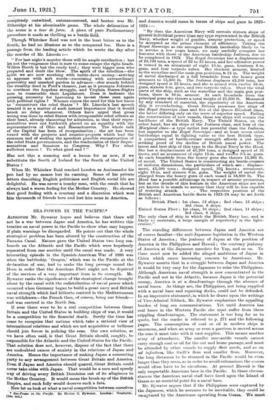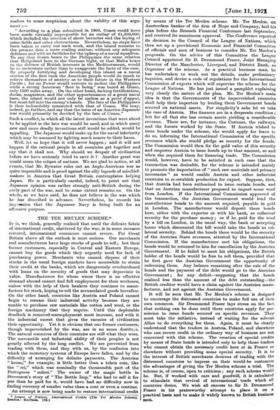SEA-POWER IN THE PACIFIC.*
AVIII0IIGH Mr. Bywater hopes and believes that there will not be a war between Japan and America, he has written this treatise on naval power in the Pacific to show what may happen if plain warnings be disregarded. He points out that the whole strategical problem has been altered by the construction of the Panama Canal. Nature gave the United States two long sea- boards on the Atlantic and the Pacific which were hopelessly separated from one another until the canal was made. A very interesting episode in the Spanish-American War of 1898 was when the battleship ' Oregon,' which was in the Pacific at the declaration of war, had to make the long passage round the Horn in order that the American Fleet might not be deprived of the services of a very important item in its strength. Mr. Bywater ranks the significance of the strategical change brought about by the canal with the redistribution of naval power which occurred when Germany began to build a great navy and British naval strength which had hitherto centred in the Mediterranean was withdrawn—the French then, of course, being our friends— and was centred in the North Sea.
If ever there were to be a real competition between Great Britain and the United States in building ships of war, it would be a competition to the financial death. Surely the time has come to recognize that nations which take a rational view of international relations and which are not acquisitive or bellicose should join forces in policing the seas. Our own solution, as we have often said, is that Great Britain should, roughly, be responsible for the Atlantic and the United States for the Pacific. That solution does not, however, dispose of the fact that there are undoUbted causes of anxiety in the relations of Japan and America. Hence the importance of making Japan a consenting party to any arrangement between Great Britain and America. Even if Japan and America should quarrel, Great Britain could never take sides with Japan. That would be a sure and speedy way of driving every British Dominion out of its allegiance to the Mother Country. It would mean the break-up of the British Empire, and such folly would deserve such a fate.
Now let us look at what a naval competition between ourselves
• Sea-Poster in'the Paeuto. By Hector 0. Bywater. London: Constable. Iles. net.]
and America would mean in terms of ships and guns in 1923- 1924:— By then the American Navy will contain sixteen ships of greater individual power than any type represented in the British Navy, whether weight of gunfire, armour protection, or speed be accepted es the prime element of efficiency. Taking the Royal Sovereign as the strongest British battleship likely to be in service a few years hence, we may usefully compare her features with those of the American battleship Indiana, due to be completed in 1923. The Royal Sovereign has a displacement of 25,750 tons, a speed of 22 to 23 knots, and her offensive power is vested in an armament of eight 15-in, guns, fourteen 6-in. guns, and four torpedo tubes. Her thickest armour, limited to the waterline and the main gun positions, SI 13 in. The weight of metal discharged at a full broadside from the heavy guns amounts to 15,360 lb. The Indiana displaces 43,200 tons, her designed speed is 23 knots, and she is armed with twelve 16-in. guns, sixteen 6-M. guns, and two torpedo tubes. Over the vital parts of the ship, such as the waterline and the main gun posi- tions, there is 16-in. armour. At each broadside from the principal guns she throws a total weight of 25,200 lb. Measured by any standard of material, the superiority of the American ship is overwhelming. Great Britain possesses five ships of the Royal Sovereign class and five of the Queen Elizabeth class, the latter differing only on the score of superior speed. Failing the construction of new vessels, these ten ships will remain the backbone of the British Navy. The United States, on the other hand, has six ships of the Indiana class, and four of the Maryland class —a type rather less powerful than the Indiana, but superior to the Royal Sovereign—and at least seven other battleships equal in fighting value to the best British type. A comparison of battle-cruiser strength affords a yet more striking proof of the decline of British naval power. The latest and best ship of this type in the Royal Navy is the Hood. She has a displacement of 41,200 tons, a desigqed speed of 31 knots, and an armament of eight 15-in. and twellve 5.5-m. guns. At each broadside from the heavy guns she throws 15,380 lb. of metal. The United States. is constructing six battle-cruisers of uniform dimensions, the particulars of which are : displace- ment, 43,500 tons ; designed speed, 33} knots ; armament, eight 16-in. and sixteen 6-in. guns. The weight of metal dis- charged from the heavy guns of each vessel is 16,800 lb. The Hood has a possible advantage in respect of armour protection, but as the details of this feature in the American ships are not yet known it is unsafe to assume that they will be less capable of resisting attack. . . . The respective position of the British and American battle fleets in 1923-24 may be set forth as follows :
British Fleet : 1st class, 13 ships ; 2nd class, 15 ships ; 3rd class, 6 ships.
United States Fleet : 1st class, 16 ships ; 2nd class, 11 ships ; 3rd class, 8 ships.
The only class of ship in which the British Navy has, and is likely to maintain, a large margin of superiority is the light- cruiser."
The standing differences between Japan and America are of course familiar—the anti-Japanese legislation in the Western States of America ; the jealousy of Japan at the position of America in the Philippines and Hawaii ; the contrary jealousy of America at the Japanese mandate for Yap, and so on. To these must now be added the alleged ambitions of Japan in China which cause increasing concern to Americans. Mr. Bywater asserts that in a struggle between Japan and America it would be very easy for the Japanese to seize the Philippines. Although American naval strength is now concentrated in the Pacific and not in the Atlantic, because Japan is the potential enemy, America is at a disadvantage through the absence of naval bases. As things are, the Philippines, not being supplied with a naval base and repairing docks, could not be defended. In an impressive statement, in which he draws upon the writings of Vice-Admiral Niblack, Mr. Bywater emphasizes the appalling burden of long sea communications. Yet until America has real bases in the Western Pacific she must suffer from these crippling disadvantages. The statement is too long for us to quote, but the reader is referred to p. 271 and the following pages. The consumption of coal or oil in modern ships is enormous, and when an army or even a garrison is moved across the seas it must take with it vast supplies. This means another army of attendants. The smaller mercantile vessels cannot carry enough coal or oil for the out and home passage, and must be attended by other vessels to supply their needs, and so on ad infinitum, like Swift's fleas and smaller fleas. Moreover, the long distances to be steamed in the Pacific would be even longer than they seem, as in order to avoid submarines the course would often have to be circuitous. At present Hawaii is the only respectable. American base in the Pacific. In these circum- stances the American naval staff have fixed. upon the Island of Guam as an essential point for a naval base.
Mr. Bywater argues that if the Philippines were captured by the Japanese, which he assumes to be inevitable, they could be recaptured by the Americans operating from Guam. We must
confess to some scepticism about the validity of this argu- ment :-
"According to a plan submitted in 1905, Guam could have been made virtually impregnable for an outlay of £1,500,000, which included the erection of shore batteries and the laying of mine-fields and other obstructions. Nevertheless, no steps have been taken to carry out such work, and the island remains to the present date a mere coaling station, without any adequate defences and with no facilities for the upkeep of a naval squadron. To say that Guam bears to the Philippines the same relation that Heligoland bore to the German bight, or that Malta bears to the defence of British interests in the Mediterranean, would be to understate rather than to exaggerate the facts of the case. By properly fortifying and developing this island as a naval station of the first rank the American people would do much to relieve themselves of anxiety as to their future in the Western Pacific ; for no Power would venture to molest the Philippines while a strong American fleet in being' was based at Guam, only 1500 miles away. On the other hand, lacking fortifications, docks, magazines, and the other appurtenances of a great naval base, the island would not only be useless as a point d'appui, but must fall into the enemy's hands. The fate of the Philippines is thus indissolubly connected with that of Guam. We may, indeed, go further, and say that the issue of an Americo-Japanese war would primarily be decided by the fate of Guam."
Such a conflict, in which all the latest inventions that were about to be applied in the late war would be used, and in which many new and more deadly inventions still would be added, would be appalling. The Japanese would make up for the naval inferiority which may be assumed by fighting much nearer to their bases.
Well, let us hope that it will never happen ; and it will not happen if the rational people in all countries get together and say that it shall not. Why should we despair of civilization before we have seriously tried to save it ? Another great war would mean the eclipse of nations. We are glad to notice, at all events, that Mr. Bywater rules out an Anglo-American war as quite impossible and is proof against the silly legends of mischief- makers in America that Great Britain contemplates helping Japan. He is particularly careful, indeed, to point out that Japanese opinion was rather strongly anti-British during the early part of the war, and to some extent remains so. On the whole, as we have said, he does not believe in the war which he has described in advance. Nevertheless, he records his impression that the Japanese Navy is being built for an offensive purpose.



































 Previous page
Previous page